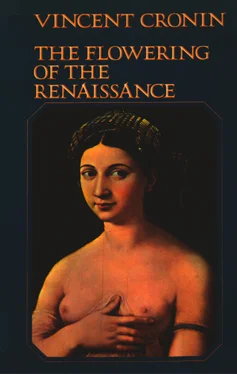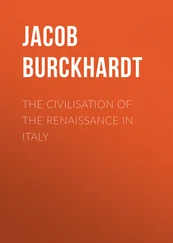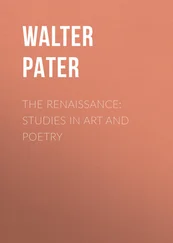These were the men who read Luther’s writings, and were stirred by his extremely powerful, scathingly witty style derived from Lucian. As so often happens, their reactions were at variance with the author’s intention, and by sheer weight of numbers they were to drag Luther in directions he did not always want to go. What appealed to the average reader was less the corruption of man than the corruption of Rome: that Babylon where Christian blood was shed with St Paul’s sword, Plato and Aristotle were painted opposite the Blessed Sacrament, and Bembo advised Sadoleto to ‘avoid the Epistles of St Paul, lest his barbarous style should spoil your taste’. In vain did Leo’s representative, Girolamo Aleandro, argue that abuses committed by Rome should not be confused with Catholic truth; as a scholar, he could not see that it is love and hate, not calm reason, that determine most men’s view of truth. In place of the authority of Rome Luther’s followers erected the authority of Scripture interpreted by the individual Christian according to the light of the Holy Spirit. This had a profound appeal at a time when the printed word, so recent an invention, still wore something of a halo. And so the rift widened: Scripture against Church, Grace against Works, Predestination against Free Will, communion service against sacrifice, the priesthood of every Christian against the teaching authority of the Pope.
In the early 1520’s it became evident in Rome that Exsurge had neither silenced Luther nor checked Lutheranism, which was beginning to erect itself into an organized Church, styled Apostolic and declaring the Roman Church heretical. An answer would have to be found, and found quickly: preferably a dogmatic answer to what was primarily a dogmatic challenge. But precisely here Rome found herself ill-prepared. Ever since 1380 when John Wycliffe first challenged traditiones humanae and William of Waterford made the mistake of defending unwritten traditions by arguing from the insufficiency of Scripture, a false antithesis had been set up: Tradition and Scripture, each envisaged separately. This had sufficed to condemn Huss, but not to provide refutation of his arguments. The Vatican had no books defending Tradition, only Raphael’s painted defence of the Real Presence.
In method also Rome found herself at a disadvantage. As Erasmus remarked, Ciceronian Latin was useless for answering heresy, since it did not contain the necessary vocabulary. There was no chair of Scripture in the Sapienza, and in the words of the Augustinian General, ‘Rome, the prince of cities, is the world’s dunce in Biblical studies.’ Sante Pagnine’s translation of the Old Testament into Latin, made in Lucca in 1518, did not find a publisher until 1528, and then only in Lyons. On his return in 1522 even Aleandro, one of Italy’s foremost humanists, sadly and belatedly had to return to school: ‘I have begun to extract from ancient authors passages which condemn the new enemies of the Church. Since the heresiarchs are always objecting that Latin authors are suspect to them, I have taken these passages from Revelation, from authors who cannot be attacked and from the Holy Councils of the early Church.’
It became obvious to the Pope and his advisers that a complete dogmatic answer could be neither quick nor easy. Meanwhile some other course must be found. The first and most obvious was to call a Council, for Luther had said, ‘I know the Church virtually only in Christ, representatively only in the Council.’ Only a Council could issue a decision which all concerned would regard as undoubtedly binding. Why then did none of the Pope’s best advisers with first hand experience of Germany—Cajetan, Campeggio, Aleandro—recommend a Council?
They were, to start with, victims of the false antithesis Papacy-Council, given new life by the recent Council of Pisa. They could not rid themselves of the fear that the rulers of Europe, acting through their bishops, would destroy the Pope’s independence by whittling away his financial and temporal power. That is why the mere rumour of the summons of a Council caused a sudden fall in the price of all saleable offices. Secondly, and perhaps even more important, they realized that Rome was insufficiently prepared to enter the arena against the new, well-trained, well-armed German gladiators, and that tactical defeat before the assembled prelates of Europe might still further rend Christ’s seamless robe. Twenty-five frustrated years were to pass before a Council would meet.
A third course presented itself: so thorough a Reform in Rome that the Lutherans’ catchword would ring hollow. Here there were hopeful signs. As early as 1515, two years before Luther’s 95 theses, a group of Roman priests and laymen had formed the Oratory of Divine Love in order to sanctify themselves by the sacraments and prayer, and so bring a reforming influence on others. Members set special value on humility: Gaetano di Thiene dwells in his letters on his unworthiness to offer Mass, wherein he, ‘a poor worm of earth, mere dust and ashes, passes, as it were, into heaven and the presence of the Blessed Trinity.’ The Oratory soon numbered more than fifty influential Romans, and from it in 1524 were to issue the Theatines, a new Order of regular clergy vowed to stringent poverty.
To members of the Oratory it seemed nothing less than a direct intervention by the Holy Spirit when the conclave held in 1523 to elect a successor to Leo chose in absentia Adrian Dedal of Utrecht, the son of a poor shipwright who had made his way by intellectual brilliance to become tutor to the Emperor and later his viceroy in Spain. ‘His face is long and pale,’ wrote the Venetian envoy of Adrian VI, ‘his body is lean, his hands are snow-white. His whole bearing impresses one with reverence; even his smile has a tinge of seriousness.’ The new Pope arrived in Rome bent on reform. When told that Leo had employed 100 grooms, he made the sign of the cross and said that four would suffice for his needs, but as it was unseemly that he should have fewer than a cardinal, he would appoint twelve. When Cardinal Trivulzio asked for a bishopric to relieve his poverty, Adrian asked, ‘What is your annual income?’ ‘4000 ducats.’ ‘Mine was 3000, yet I lived on it and even saved.’ It was not meant as a boast. ‘All of us, prelates and clergy, have gone astray, and for long there is none that has done good; no, not one.’
Adrian celebrated Mass daily—and this for a Pope was an innovation. His meals, which he ate alone, were Spartan: a dish of veal or beef, sometimes a soup. When the Laocoön was proudly shown him, he observed dryly—and inexactly: ‘They are only the effigies of heathen idols,’ and ordered all the entrances to the Belvedere walled up save one, the key to which he kept himself. Leo’s poets and painters he would not even see, far less employ. All his time he gave to economies and the appointment of holy, hard-working bishops, who might do something to improve the Italian clergy, only two per cent of whom understood their Latin breviary.
But Adrian lacked warmth and a knowledge of the Italian mind. A Venetian applied to him Cicero’s remark on Cato: ‘He acts as though he were living in some republic of Plato’s, not among the dregs of Romulus.’ The ‘dregs’ hated Adrian. Starved of the pomp which filled their pockets and made their eyes brighten, they jeered at the Pope as a barbarian and mocked at the tongue-twisting names of his advisers: Enkevoirt, Dietrich von Heeze, Johann Ingenwinkel. They composed bitter pasquinades:
Caduto è a terra il gran nome romano
a dato in preda al barbero furore
The great name of Rome has tumbled
And become a prey to the furious barbarian
—little knowing that the lines held a tragic prophecy. At every turn the Romans opposed reform, the whole idea of which they ridiculed. As a result Adrian lived a lonely, wretched life, taking stringent precautions against poison. Then, only thirteen months after entering Rome, he fell ill of a kidney disease induced by the climate—it too was hostile. After asking that no more than 25 ducats be spent on his funeral, this would-be reformer left a world he could not reform. While the Romans facetiously gave thanks to his doctor, an epitaph was cut for his tomb: ‘Alas! how much do the efforts [ virtus ], even of the best of men, depend upon time and opportunity.’
Читать дальше












